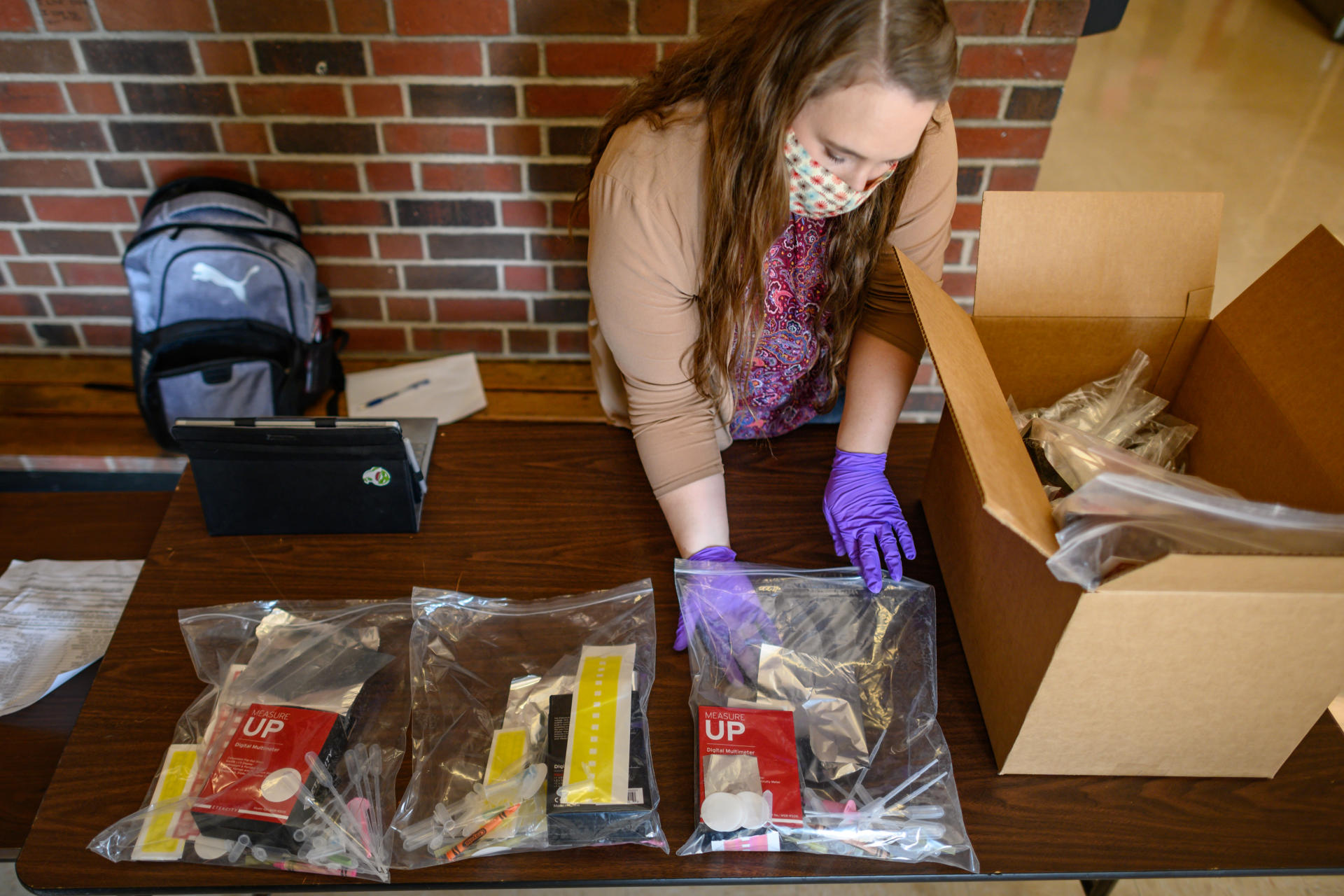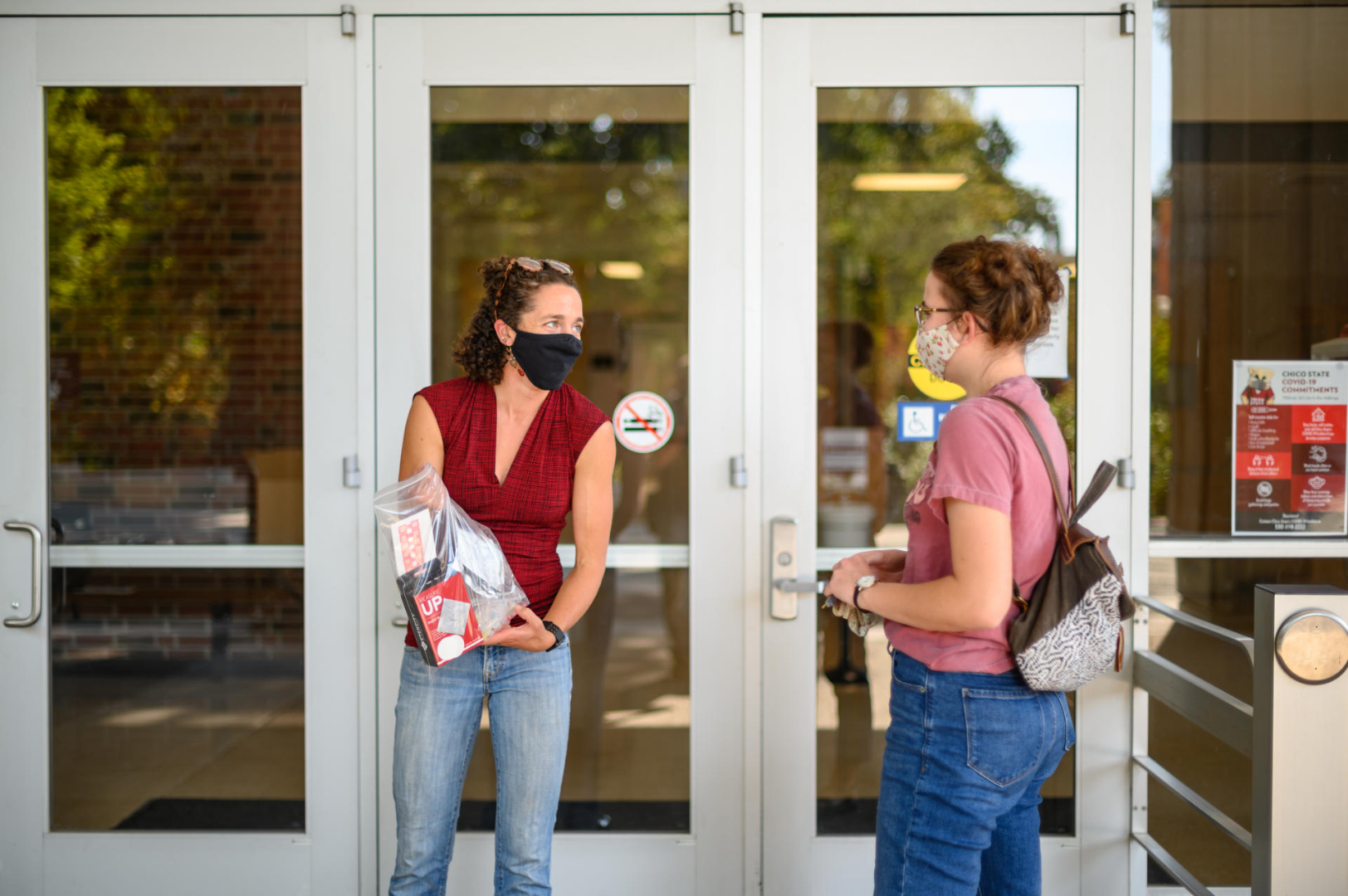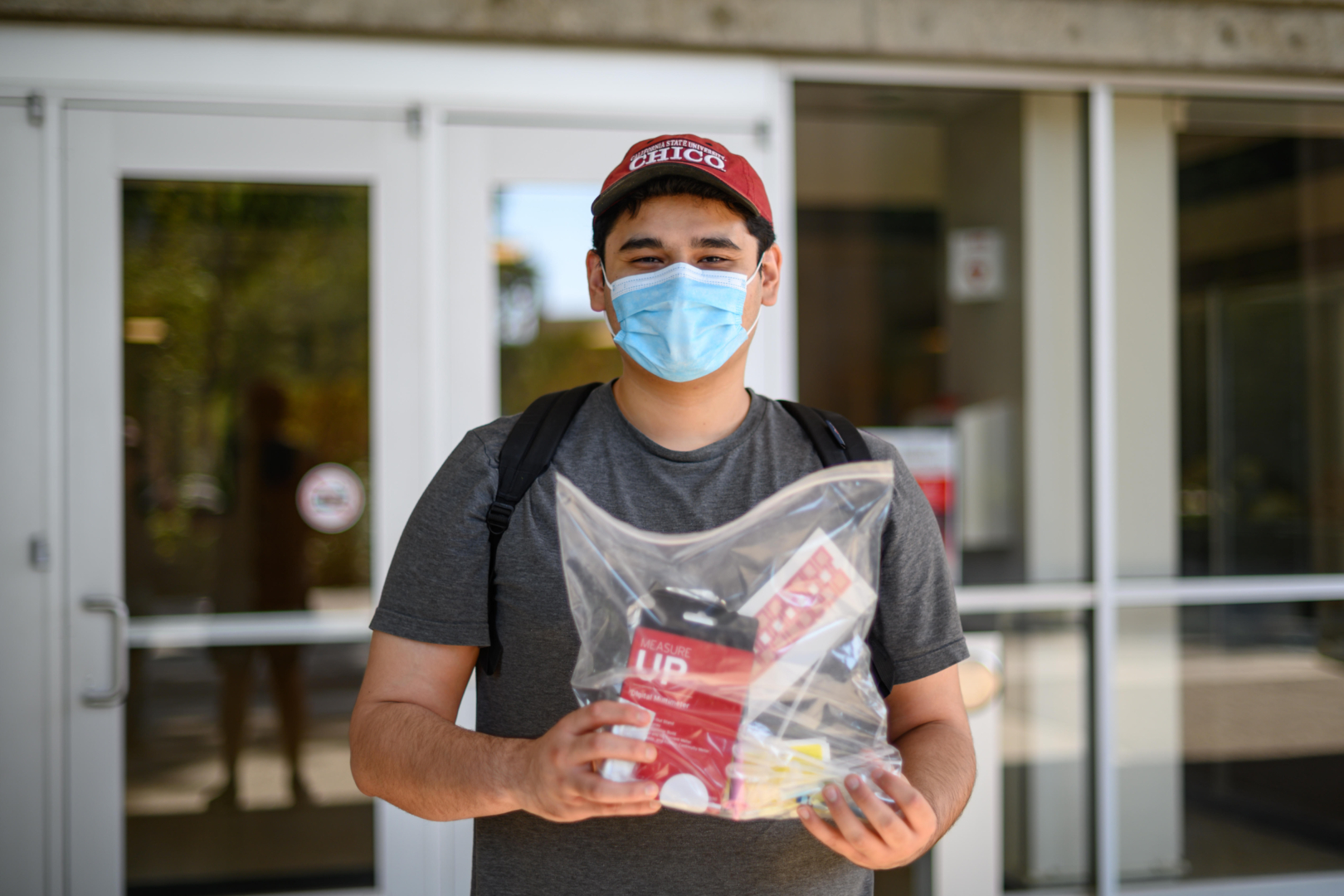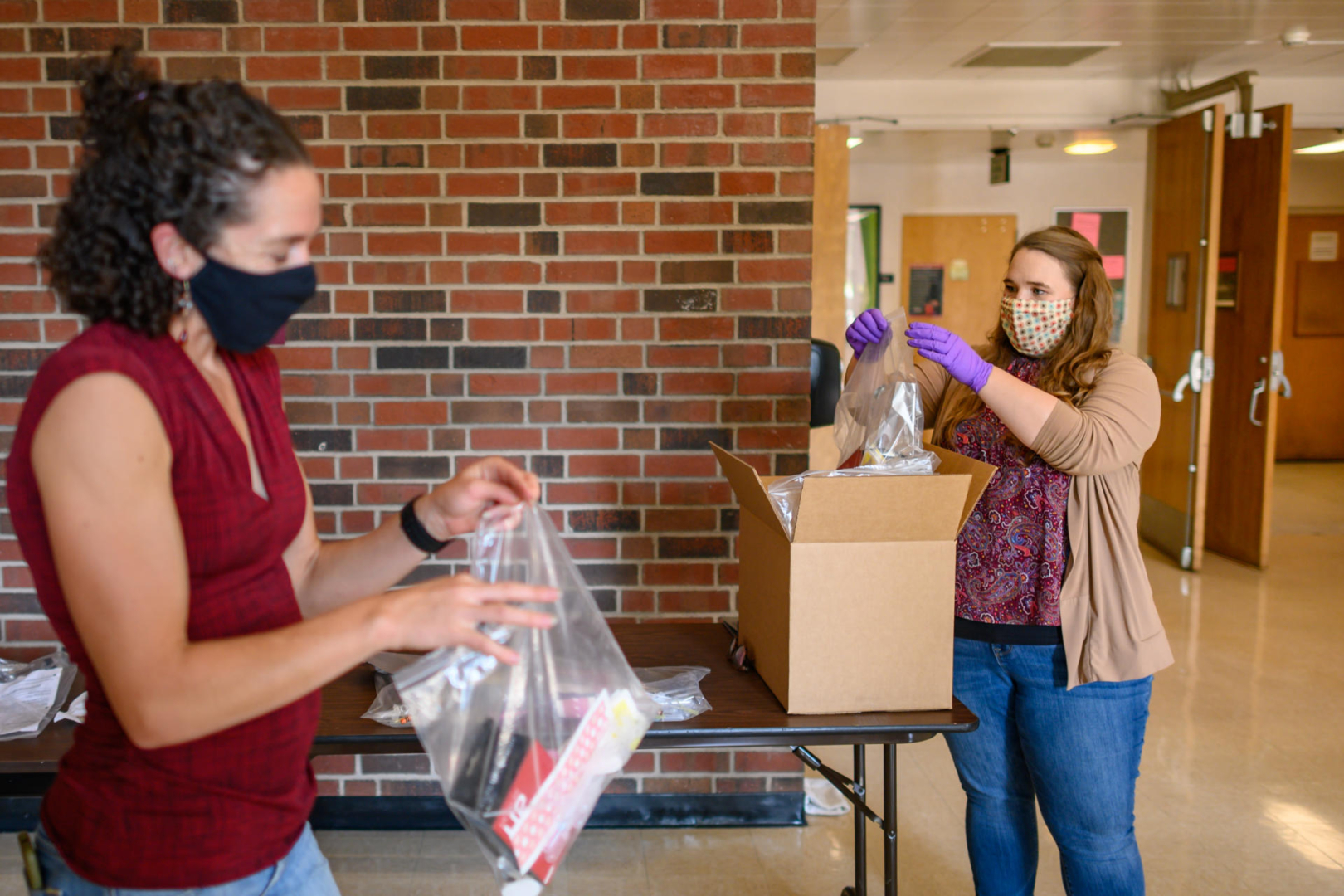Chemistry Kits Deliver At-Home Learning Opportunities

Lisa Kendhammer prepares chemistry kits for students to use as they attend virtual classes on Wednesday, September 23, 2020 in Chico, Calif. The campus community adjust to suspension of in-person instruction due to impacts of the coronavirus (COVID-19) pandemic. (Jason Halley/University Photographer/CSU, Chico)
Chemistry professors wouldn’t ordinarily ask their students to run experiments on beverages from their own refrigerators. But then again, the 2020–21 academic year has truly been extraordinary.
In a move to accommodate Chico State’s pivot to virtual learning amid the COVID-19 pandemic, Department of Chemistry and Biochemistry professors Lisa Ott and Lisa Kendhammer are helping their students with vital hands-on training by utilizing at-home chemistry kits provided by the MICRO Engaged Laboratory Learning program.
Funded by the National Science Foundation and the Howard Hughes Medical Institute, the MICRO Lab program was developed by science collaborators from Skidmore College, the University of Iowa, the University of Notre Dame, and Oregon State University. The program’s goal is to create enriching and engaging laboratory experiments in the remote learning environment—which is vital to the continued learning of science students in colleges and universities across the country who depend on hands-on experience and lab opportunities for their education.
Earlier this semester, boxes of testing materials—from pipettes and glassware to pH paper and voltmeters—were delivered on campus or mailed directly to the residences of approximately 30 Chico State chemistry students to ensure they had exactly what they need to run tests and collect data for their assignments. In her 13th year teaching on campus, Ott said the idea of the MICRO Lab is to inch away from the traditional lecture-based classroom and move closer to a more active participation by the students—and to also return some kind of normalcy to a semester that has been anything but.
“These labs are designed so the students have a lot of control over the design of the experiment, how they prepare their solutions, how they do their calculations, how they get everything carried out,” she said.
Ott typically leads 90 hours of in-person lab work for each class every semester—hours that the students are missing out on. So, MICRO Lab equipment is proving to be an excellent alternative.

“The challenge was really giving them an appropriate substitution for the lab hours they would have had if we had been able to stay on campus,” she said.
Cellular and molecular biology major Yesica Nava has enjoyed the idea of taking advantage of items she can find in her fridge or pantry. Being able to conduct the experiments at home, she added, has lifted some of the stress inherent in in-person labs.
“When you’re in lab in person, it can feel kind of formal and you sometimes get stressed out about finishing on time,” said Nava, who will graduate in May. “When you’re at home, there’s less stress, you’re more relaxed, and it’s cool that you’re incorporating your life into the chemistry and not just associating it with this lab on campus all the time.”
For example, in one experiment, Ott’s students were conducting spectrophotometry tests—analyzing the colors of different liquids. If for some reason the students were unable to find and use food coloring, Ott suggested other fun and easily accessible alternatives.
“The lab is all written to use food coloring, but I said, ‘go and use anything with color,’” she said. “I said, ‘Do you have Gatorade? Great! Do you have tea? Fantastic! Coffee? Wonderful!’”
Kendhammer, in her fifth year teaching at Chico State, sees her students doing well under the less-than-ideal circumstances of virtual learning. Rather than just reading about or watching videos on the careful handling and usage of testing equipment, solutions, and data collection, the students are empowered to think critically as they’re conducting experiments.
“I could tell you to do something, but if you don’t actually try it yourself, you’re not going to get it right on the first try,” Kendhammer said. “You need that practice, just as you do with most things physical, and the students get that with MICRO Lab.”

This summer, Ott applied to participate in MICRO Lab on behalf of her department, anticipating a possible move to virtual learning sometime during the fall semester—and Chico State was one of approximately 20 higher education institutions nationwide chosen to help pilot the program. Faculty participated in a three-day summer workshop to familiarize themselves with the materials and lessons, and they committed to deploying a minimum of three labs from the program this academic year—Chico State will do four.
Microbiology major Isaac Adelman said that while he truly enjoys in-person lab work, using the MICRO Lab equipment from his home in Chico has given him and his classmates the opportunity to have a say in how lessons and labs are deployed.
“A few times, there have been revisions and as we go, people find more optimal ways to do the procedures, which kind of changes the course of how you do the entire lab,” he said. “The students are able to figure out the best way to do the procedure to get the best results—it’s a very cool experience.”
Adelman, a senior, said faculty make themselves available to listen to the students’ feedback on the lessons—either scheduled or impromptu Zoom get-togethers—because it benefits the learning experience for everyone.
“The faculty have been very open to suggestions, because in a crazy time like this, no one is 100 percent right all the time knowing what the best thing is to do,” he said. “It’s really cool that the faculty is super responsive to any suggestions we have.”

With an innovative way to conduct their lab lessons, students are not hitting the pause button on what lies ahead following graduation—whether continuing graduate school or immediately finding research work in the private sector.
“Graduate programs want students who can come in and know a lot of the skills and techniques needed in the lab,” Kendhammer said. “Just knowing a little bit about the instrument is a lot different than having worked on it and being able to program it—our students are still getting that valuable experience.”
As a pilot project, the MICRO Lab will continue in the spring semester and likely be utilized even after a return to in-person instruction.
Adelman sees it as a bright spot among the challenges of the pandemic. He encourages other students to remain “curious and open-minded and make the best of the situation we have at hand.”
“Learning is what you make of it, so the more you’re willing to put in and try to do the MICRO Lab or any schoolwork the best you can and look for faculty feedback, you can really normalize the entire experience,” he said.


